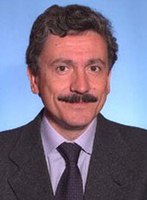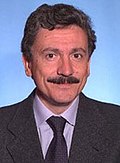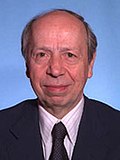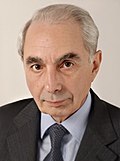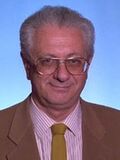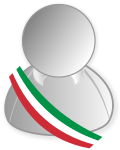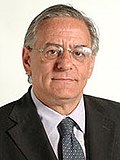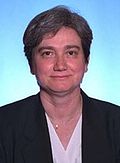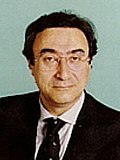Portrait Office Name Term Party Undersecretaries Prime Minister Massimo D'Alema 21 October 1998 – 22 December 1999 Democrats of the Left Franco Bassanini (DS) Marco Minniti (DS) [ a] Deputy Prime Minister [ b] Sergio Mattarella 21 October 1998 – 22 December 1999 Italian People's Party Minister of Foreign Affairs Lamberto Dini 21 October 1998 – 22 December 1999 Italian Renewal Valentino Martelli (UDR) Umberto Ranieri (DS) Rino Serri (DS) Patrizia Toia (PPI) Minister of the Interior Rosa Russo Iervolino 21 October 1998 – 22 December 1999 Italian People's Party Franco Barberi (Ind.) Alberto La Volpe (SDI) Diego Masi (UDR) Alberto Gaetano Maritati (DS) Giannicola Sinisi (PPI) Adriana Vigneri (DS) Minister of Grace and Justice Oliviero Diliberto 21 October 1998 – 22 December 1999 Party of Italian Communists Giuseppe Ayala (DS) Franco Corleone (FdV) Marianna Li Calzi (RI) Maretta Scoca (UDR) Minister of Treasury, Budget and Economic Planning Carlo Azeglio Ciampi 21 October 1998 – 13 May 1999 Independent Stefano Cusumano (UDR) Natale D'Amico (RI) Dino Piero Giarda (Ind.) Laura Pennacchi (DS) Giorgio Macciotta (DS) Roberto Pinza (PPI) Bruno Solaroli (DS) Giuliano Amato 13 May 1999 – 22 December 1999 Independent Minister of Finance Vincenzo Visco 21 October 1998 – 22 December 1999 Democrats of the Left Ferdinando De Franciscis (PPI) Fausto Vigevani (DS) Gian Franco Schietroma (SDI) Minister of Defence Carlo Scognamiglio 21 October 1998 – 22 December 1999 Democratic Union for the Republic Fabrizio Abbate (PPI) Massimo Brutti (DS) Paolo Guerrini (PdCI) Gianni Rivera (RI) Minister of Public Education Luigi Berlinguer 21 October 1998 – 22 December 1999 Democrats of the Left Teresio Delfino (UDR) Nadia Masini (DS) Carla Rocchi (FdV) Sergio Zoppi (PPI) Minister of Public Works Enrico Luigi Micheli 21 October 1998 – 22 December 1999 Italian People's Party Antonio Bargone (DS) Mauro Fabris (UDR) Gianni Francesco Mattioli (FdV) Minister of Agricultural and Forestry Policies Paolo De Castro 21 October 1998 – 22 December 1999 Independent Roberto Borroni (DS) Nicola Fusillo (PPI) Minister of Transport and Navigation Tiziano Treu 21 October 1998 – 22 December 1999 Italian Renewal Giordano Angelini (DS) Luca Danese (UDR) Minister of Communications Salvatore Cardinale 21 October 1998 – 22 December 1999 Democratic Union for the Republic Vincenzo Maria Vita (DS) Michele Lauria (PPI) Minister of Industry, Commerce and Craftsmanship Pier Luigi Bersani 21 October 1998 – 22 December 1999 Democrats of the Left Umberto Carpi (DS) Gianfranco Morgando (PPI) Minister of Labour and Social Security Antonio Bassolino 21 October 1998 – 21 June 1999 Democrats of the Left Claudio Caron (PdCI) Bianca Maria Fiorillo (RI) Raffaele Morese (Ind.) Luigi Viviani (DS) Cesare Salvi 21 June 1999 – 22 December 1999 Democrats of the Left Minister of Foreign Trade Piero Fassino 21 October 1998 – 22 December 1999 Democrats of the Left Antonello Cabras (DS) Minister of Health Rosy Bindi 21 October 1998 – 22 December 1999 Italian People's Party Monica Bettoni Brandani (DS) Antonino Mangiacavallo (RI) Minister of Cultural Heritage and Activities Giovanna Melandri 21 October 1998 – 22 December 1999 Democrats of the Left Giampaolo D'Andrea (PPI) Agazio Loiero (UDR) Minister of the Environment Edo Ronchi 21 October 1998 – 22 December 1999 Federation of the Greens Valerio Calzolaio (DS) Minister of University, Scientific Research and Technology Ortensio Zecchino 21 October 1998 – 22 December 1999 Italian People's Party Antonino Cuffaro (PdCI) Luciano Guerzoni (DS) Minister for Institutional Reforms (without portfolio) Giuliano Amato 21 October 1998 – 13 May 1999 Independent Antonio Maccanico 13 May 1999 – 22 December 1999 The Democrats Minister for Equal Opportunities (without portfolio) Laura Balbo 21 October 1998 – 22 December 1999 Federation of the Greens Minister of Regional Affairs (without portfolio) Katia Bellillo 21 October 1998 – 22 December 1999 Party of Italian Communists Minister for Parliamentary Relations (without portfolio) Gian Guido Folloni 21 October 1998 – 22 December 1999 Democratic Union for the Republic Elena Montecchi (DS) Minister of Public Function (without portfolio) Angelo Piazza 21 October 1998 – 22 December 1999 Italian Democratic Socialists Gianclaudio Bressa (PPI) Minister of Social Solidarity (without portfolio) Livia Turco 21 October 1998 – 22 December 1999 Democrats of the Left Minister of Community Policies (without portfolio) Enrico Letta 21 October 1998 – 22 December 1999 Italian People's Party 